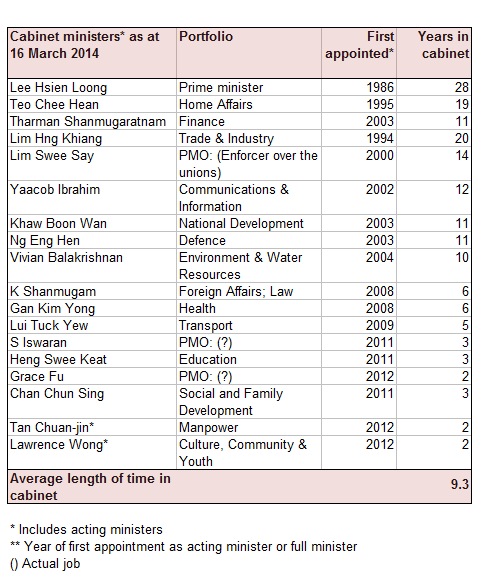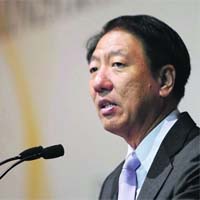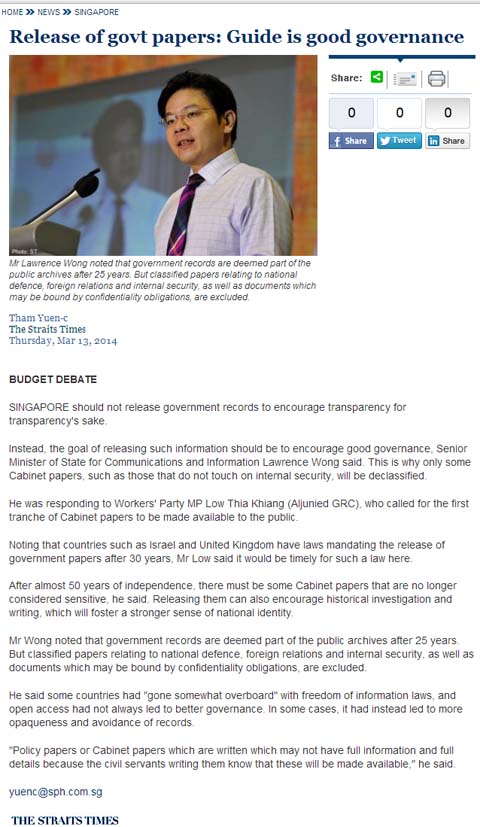
 |
|
|||||||
| Coffee Shop Talk of a non sexual Nature Visit Sam's Alfresco Heaven. Singapore's best Alfresco Coffee Experience! If you're up to your ears with all this Sex Talk and would like to take a break from it all to discuss other interesting aspects of life in Singapore, pop over and join in the fun. |
 |
|
|
Thread Tools |
|
#1
|
|||
|
|||
|
An honorable member of the Coffee Shop Has Just Posted the Following:
Source: Yawing Bread This August (2014), Lee Hsien Loong will have served ten lacklustre years as prime minister. Enough. Even undemocratic China has instituted a ten-year rule for the top posts in both the party and the cabinet. In all areas of life, creative destruction makes regeneration and revitalisation possible. In Singapore’s politics, this cannot happen if people stay too long in their offices getting ever more defensive about their record and unwilling to admit that past decisions were wrong and therefore need changing. The ruling People’s Action Party (PAP) may counter by saying that they regularly refresh the cabinet with new blood. But here are the facts:  As you can see from the table above, the average length of time a minister has been in his job is over nine years. Lee himself has 28 years of decisions to worry losing face over. Others, like Teo Chee Hean (right) and Lim Hng Khiang, have been around for about twenty years. For a small country that needs to be nimble and at the cutting edge, this sclerotic state of the cabinet is a recipe for failure.  It also explains why the “out of touch” criticism has currency. Paid ridiculously high salaries and isolated behind security men, their last memory of “average” Singapore life is a decade or more ago. That is provided they grew up in average families. If they didn’t, e.g. Teo Chee Hean, son of a rich banker, Grace Fu, daughter of a the Press Secretary to Lee Kuan Yew, or Lee Hsien Loong, the son of Singapore’s fiery demigod, they probably never knew average life. Trouble is compounded by the way people rise in the PAP to become ministers. Absent internal democracy, the party has an opaque selection process where the “elders” choose their successors. They may claim, and perhaps even delude themselves, that they are objective, but anyone with the slightest inkling of human psychology will suspect that the process filters out anyone that is uncomfortably different from those who do the filtering. They may be looking for management expertise, but they are also, subconsciously or otherwise, looking for similar belief systems. So not only is the average of nine years way more than the in most other developed countries, it is worse because of the closed nature of the promotion process. I think we need to institute a rule that no one shall serve more than 12 years in total, continuously or discontinuously, as a cabinet minister; no one shall serve more than 8 years continuously as a cabinet minister — and that includes as prime minister. [Update 17 March 2014: On second thoughts, maybe we can add eight more years for those who make it to prime minister or deputy prime minister] * * * * * Related to this the call by Workers’Party leader Low Thia Khiang for Singapore to institute a thirty-year rule for the release of cabinet papers into the public domain. "… in many democratic countries with advanced social and economic development, they have what has been famously termed, the “thirty-year rule”, whereby yearly Cabinet Papers are released for public information and research, thirty years after they are created. In fact, the United Kingdom is now moving towards a twenty-year rule. In Israel, the thirty-year rule is subject to state security and foreign policy sensitivities. Mdm Chair, I am sure we are in a better position than Israel in these respects. The principles behind the thirty-year rule, not only concern transparency and accountability to maintain public trust in the government, but also in encouraging historical investigation and writing, to foster a strong sense of national identity." – Low Thia Khiang, Parliamentary debate (Committee of Supply), 10 March 2014 This must be a scary idea for the PAP cabinet, especially Lee Hsien Loong. It won’t be long, for example, before it’s been 30 years since the arrests and detention without trial of the so-called “Marxist conspirators” in 1987. It is an episode now widely believed to be an abuse of power by the government of the day. Lee was a cabinet minister then. Wouldn’t we like to see what contributions he made to the decision? Also, what kind of debate occurred in cabinet in the 1980s prior to the implementation of the Group Representation Constituency scheme that has distorted our democracy so much since? Of course, the PAP government rejected Low’s proposal, but look carefully and you’ll see how weak their argument was. That didn’t stop our lapdog mainstream media from leading the story with the rejection. In typical Straits Times journalistic style, the PAP’s position is given the headline and the opening of the story; only if you read on, do you get to the opposition member’s question. Its placement tells you it is treated as mere background context to better understand why PAP pronounced the “truth” as it did. As archived on AsiaOne, here is the Straits Times’ story:  Lawrence Wong firstly relies on the “good governance” test as if it were some uncontroversial litmus test when few people can agree on what exactly constitutes good governance. In any case, it is not assured that the PAP has delivered good governance and will pass the test, especially as good governance can be said to include transparency, accountability, democratic resilience and solid pillars of rights, including the right to information. It is precisely in support of these elements that cabinet papers should be released within a reasonable time frame. Secondly, saying that knowledge that papers will be released in time will cause civil servants to avoid putting thoughts on paper doesn’t gel with reality. In a bureaucratic age with a vast state machinery, you cannot avoid communicating by writing. Even if a few things are carefully left out, a release of masses of evidence will allow investigators to piece together the missing nuggets from references made in other papers. It’s time for both: term limits and a 30-year rule for the release of cabinet papers. Click here to view the whole thread at www.sammyboy.com. |
| Advert Space Available |
 |
| Bookmarks |
| Thread Tools | |
|
|